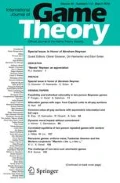Abstract
The purpose of this paper is to extend the rights egalitarian solution (Herrero et al. in Math Soc Sci 37:59–77, 1999) to the context of non-transferable utility sharing problems. Such an extension is not unique. Depending on the kind of properties we want to preserve we obtain two different generalizations. One is the “proportional solution”, that corresponds to the Kalai–Smorodinsky solution for surplus sharing problems and the solution in Herrero (Soc Choice Welf 15:113–119, 1998) for rationing problems. The other is the “Nash solution”, that corresponds to the standard Nash bargaining solution for surplus sharing problems and the Nash rationing solution (Mariotti and Villar in Int J Game Theory 33:367–377, 2005) for the case of rationing problems.
Similar content being viewed by others
References
Borm P, Keiding H, McLean RP, Oortwijn S, Tijs S (1992) The compromise value for NTU games. Int J Game Theory 21: 175–189
Chun Y, Thomson W (1992) Bargaining problems with claims. Math Soc Sci 24: 19–33
Hart S (1985) An axiomatization of Harsanyi’s nontrasferable utility solution. Econometrica 53: 1295–1313
Hart S (1994) On prize games. In: Meggido N (eds) Essays in game theory. Springer, Berlin, pp 111–121
Hart S (2004) A comparison of non-transferable utility values. Theory Decis 56: 35–46
Hart S (2005) An axiomatization of the consistent non-transferable utility value. Int J Game Theory 33: 355–366
Hart S, Mas-Colell A (1989) Potential value and consistency. Econometrica 57: 589–614
Hart S, Mas-Colell A (1996) Bargaining and value. Econometrica 64: 357–380
Harsanyi JC (1963) A simplified bargaining model for the n-person cooperative game. Int Econ Rev 4: 194–220
Herrero C (1998) Endogenous reference points and the adjusted proportional solution for bargaining problems with claims. Soc Choice Welf 15: 113–119
Herrero C, Maschler M, Villar A (1999) Individual rights and collective responsibility: the rights egalitarian solution. Math Soc Sci 37: 59–77
Kalai E, Smorodinsky M (1975) Other solutions to Nash’s bargaining problem. Econometrica 45: 513–518
Maschler M, Owen G (1989) The consistent Shapley value for hyperplane games. Int J Game Theory 18: 389–407
Maschler M, Owen G (1992) The consistent Shapley value for games without side payments. In: Selten R (ed) Rational interaction. Springer
Mariotti M, Villar A (2005) The Nash rationing solution. Int J Game Theory 33: 367–377
Moulin H (1988) Axioms for cooperative decision making. Cambridge University Press, Cambridge
Moulin H (2002) Axiomatic cost and surplus sharing, Chapter 6. In: Arrow KJ, Sen A, Suzumura K (eds) The handbook of social choice and welfare, vol 1. Elsevier, pp 289–357
Nash JF (1950) The bargaining problem. Econometrica 28: 155–162
Shapley LS (1969) Utility comparisons and the theory of games. In: La Décision. Paris, Editions du CNRS, pp 251–263
Thomson W (2003) Axiomatic analyses of bankruptcy and taxation problems: a survey. Math Soc Sci 45: 249–297
Young P (1987) On dividing an amount according to individual claims or liabilities. Math Oper Res 12: 398–414
Young P (1994) Equity. Princeton University Press, Princeton
Author information
Authors and Affiliations
Corresponding author
Rights and permissions
About this article
Cite this article
Herrero, C., Villar, A. The rights egalitarian solution for NTU sharing problems. Int J Game Theory 39, 137–150 (2010). https://doi.org/10.1007/s00182-009-0177-2
Accepted:
Published:
Issue Date:
DOI: https://doi.org/10.1007/s00182-009-0177-2




